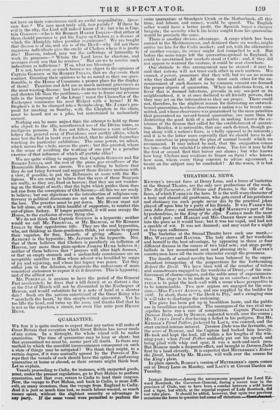QUARANTINE.
WE fear it is quite useless to expect that any nation will make of Great Britain that exception which Great Britain has never made of any nation. In a fortnight, the whole island will be under quarantine. The time of quarantine may be long or short; but that quarantined we must be, seems past all doubt. Is there any method by which the manifold inconveniences consequent on such a state of things may be mitigated? We think they might, to a certain degree, if it were mutually agreed by the Powers of Eu- rope that the vessels of each should have the option of performing quarantine at home or abroad, as their owners might think best. Let us explain. Vessels proceeding to Cadiz, for instance, with suspected goods, ninst, under the present regulations, go to Port Mahon to perform quarantine, and that over, return to Cadiz to land their cargoes. Now, the voyage to Port Mahon, and back to Cadiz, is more diffi- cult, on many occasions, than the voyage from England to Cadiz. And it is just so much time lost, so much labour wasted, so much money spent, without the slightest security or advantage to any party. If the same vessel were permitted to perform the same quarantine at Standgate Creek or the Motherbank, all this time, and labour, and money, would be spared. The English seller would have a better profit, the Spanish buyer a cheaper bargain; the security which the latter sought from his quarantine would be precisely the same.
There is another obvious advantage. A cargo which has been carried to the Mediterranean, and detained there six weeks, might arrive too late for the Cadiz market; and yet, with the alternative of another voyage, its owner might feel compelled to sell. But before the same cargo left the quarantine-ground in England, it could be ascertained how markets stood at Cadiz: and, if they did not appear to warrant the venture, it could be sent elsewhere.
One obstacle to this arrangement may be started : it may be said that nations will not trust each other in such matters. We cannot, a priori, pronounce that they will, but we see no reason why they should not. All of' them trust each other for the an- nouncement of such diseases as by common consent are deemed the proper objects of quarantine. When an infectious fever, or a fever that is deemed infectious, prevails in any sea-port or its neighbourhood, it is at once declared to all friendly powers, that they may act on the information as they see proper. There could not, therefore, be the slightest reason for distrusting an outward- bound quarantine, to whose observance a nation was by treaty com- mitted, and whose observance was guaranteed by the same penalties that guaranteed an inward-bound quarantine, any more than for distrusting the good faith of a nation in making known the ex- istence of the disease that called for the establishment of quaran- tine. Besides, it is noticeable, that any such distrust, though go- ing along with a nation's fears, is wholly opposed to its interests ; and it is to the latter more especially that we should have to ad- dress ourselves in proposing the plan of mutual benefit which we recommend. It may indeed be said, that the suggestion comes too late—that the mischief is already done. Too late it may be for the first or second fleet that leaves our shores ; but who knows how long Cholera may continue to linger on them ? who knows how soon, where every thing concurs to advise agreement, a treaty on the subject may be concluded ? At the worst, it is but a trial.


























 Previous page
Previous page